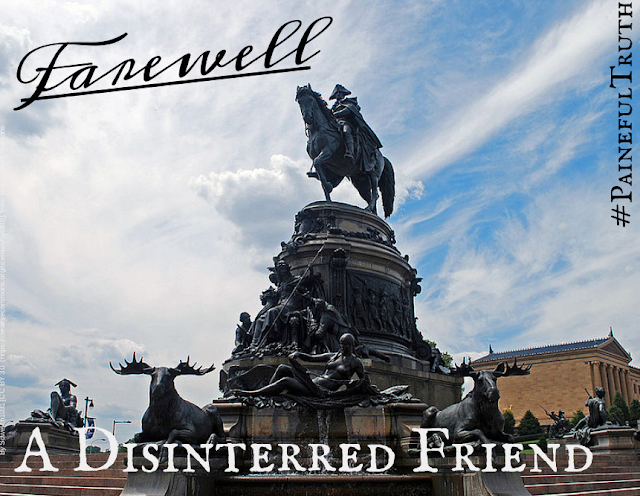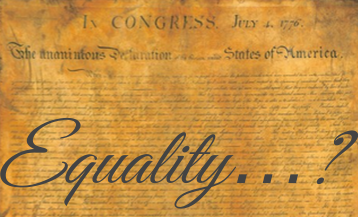The Advice of a Disinterested Friend - George Washington's Farewell Address, 1796, Chapter 6
1796
“Here, perhaps, I ought to stop.
But a solicitude for your welfare, which cannot end but with my life, and the apprehension of danger, natural to that solicitude, urge me, on an occasion like the present, to offer to your solemn contemplation, and to recommend to your frequent review, some sentiments which are the result of much reflection, of no inconsiderable observation, and which appear to me all-important to the permanency of your felicity as a people.
These will be offered to you with the more freedom, as you can only see in them the disinterested warnings of a parting friend, who can possibly have no personal motive to bias his counsel. Nor can I forget, as an encouragement to it, your indulgent reception of my sentiments on a former and not dissimilar occasion.”
“Here, perhaps, I ought to stop.
But a solicitude for your welfare, which cannot end but with my life, and the apprehension of danger, natural to that solicitude, urge me, on an occasion like the present, to offer to your solemn contemplation, and to recommend to your frequent review, some sentiments which are the result of much reflection, of no inconsiderable observation, and which appear to me all-important to the permanency of your felicity as a people.
These will be offered to you with the more freedom, as you can only see in them the disinterested warnings of a parting friend, who can possibly have no personal motive to bias his counsel. Nor can I forget, as an encouragement to it, your indulgent reception of my sentiments on a former and not dissimilar occasion.”
The Courage to Say It
Washington was about as popular as you can get. For many people, this kind of popularity is a fatal trap. It is alluring, captivating. Combined with power, it seems nearly impossible for many to escape once they are caught in its grasp.
Once caught, the desire to stay popular and powerful can be overwhelming. A person trapped in this position will do anything and everything to stay in this position. They will also avoid doing things that have the possibility of losing them this position, including saying things that are unpopular.
Up until this point, Washington’s words are pretty uncontroversial, a fact that he realizes and acknowledges. “Here, perhaps, I ought to stop…”
And yet he does not stop.
Washington sense a danger to this new country. No matter what the consequences to his power or popularity might be, he was going to speak the truth boldly. It takes courage to say what needs to be said when you know your audience might not want to hear it. But this is where the boys are separated from the men.
Once caught, the desire to stay popular and powerful can be overwhelming. A person trapped in this position will do anything and everything to stay in this position. They will also avoid doing things that have the possibility of losing them this position, including saying things that are unpopular.
Up until this point, Washington’s words are pretty uncontroversial, a fact that he realizes and acknowledges. “Here, perhaps, I ought to stop…”
And yet he does not stop.
Washington sense a danger to this new country. No matter what the consequences to his power or popularity might be, he was going to speak the truth boldly. It takes courage to say what needs to be said when you know your audience might not want to hear it. But this is where the boys are separated from the men.
The Apprehension’s Source
Like I mentioned earlier, Washington went through tremendous trials and tribulations to see this new nation be born. This state of fatherhood inspired a love and care unrivaled by any mere politician.
Here he is setting up the motivation, the reasons, behind what he is about to say. Realizing that his following words might be controversial, Washington wanted to make it clear to his listeners that his only motivation is the wellbeing of America (or their solicitude if you’re from the 1700s).
Where did Washington get this apprehension of danger?
Nowadays, there are countless pundits and self-proclaimed experts in the political arena. Everyday they spew forth content and opinions that may or may not be beneficial to our country’s felicity. The opinions range from one end of the political spectrum to the other with a lot of variance in between. The danger proclaimed by one is seen as a good thing by another. With so much coming out of them everyday, one has to wonder where do they come up with this stuff?
You do not have to wonder where Washington’s commentary and advice come from. The rest of the Farewell Address flows from 3 things: solemn contemplation, much reflection, and no inconsiderate observation.
How much solemn contemplation do we see going on these days? Our response to issues has become almost an instant, automatic reflex. Tweest zing around the internet like a swarm of mosquitoes with about the same effect.
Or what about reflection? The amount of reflection going on today could hardly be described by the adjective “much”. Reflection involves quietly looking back, examining not only your past actions but those of others, seeing what the consequences were.
Inconsiderate observation. Here are two words that most of us would probably not necessarily combine. That is actually one of the reasons I love studying the Founders’ writings, because they have a depth that is sorely lacking today. What does inconsiderate observation mean? He is not talking about being rude while you watching something.
Rather Washington is talking about what Sir Arthur Conan Doyle's’ Sherlock Holmes would later describe as “seeing but not observing”. Things pass before your senses, creating vague impressions and beliefs. However, we do not take the time to truly consider the things we are seeing and experiencing. The opposite of an inconsiderate observation would be a considerate observation. We would consider, ponder, mull over the things that we observe.
Washington’s methods were methodical and measured. His observations and opinions regarding his apprehension of danger were given extreme weight and attention because America knew that he was not merely firing off a tweet about the latest hot button issue. Washington’s words were always sourced from solemn contemplation, much reflection, and considerate observation.
Today
Here he is setting up the motivation, the reasons, behind what he is about to say. Realizing that his following words might be controversial, Washington wanted to make it clear to his listeners that his only motivation is the wellbeing of America (or their solicitude if you’re from the 1700s).
Where did Washington get this apprehension of danger?
Nowadays, there are countless pundits and self-proclaimed experts in the political arena. Everyday they spew forth content and opinions that may or may not be beneficial to our country’s felicity. The opinions range from one end of the political spectrum to the other with a lot of variance in between. The danger proclaimed by one is seen as a good thing by another. With so much coming out of them everyday, one has to wonder where do they come up with this stuff?
You do not have to wonder where Washington’s commentary and advice come from. The rest of the Farewell Address flows from 3 things: solemn contemplation, much reflection, and no inconsiderate observation.
How much solemn contemplation do we see going on these days? Our response to issues has become almost an instant, automatic reflex. Tweest zing around the internet like a swarm of mosquitoes with about the same effect.
Or what about reflection? The amount of reflection going on today could hardly be described by the adjective “much”. Reflection involves quietly looking back, examining not only your past actions but those of others, seeing what the consequences were.
Inconsiderate observation. Here are two words that most of us would probably not necessarily combine. That is actually one of the reasons I love studying the Founders’ writings, because they have a depth that is sorely lacking today. What does inconsiderate observation mean? He is not talking about being rude while you watching something.
Rather Washington is talking about what Sir Arthur Conan Doyle's’ Sherlock Holmes would later describe as “seeing but not observing”. Things pass before your senses, creating vague impressions and beliefs. However, we do not take the time to truly consider the things we are seeing and experiencing. The opposite of an inconsiderate observation would be a considerate observation. We would consider, ponder, mull over the things that we observe.
Washington’s methods were methodical and measured. His observations and opinions regarding his apprehension of danger were given extreme weight and attention because America knew that he was not merely firing off a tweet about the latest hot button issue. Washington’s words were always sourced from solemn contemplation, much reflection, and considerate observation.
Today
How many people in political office could honestly say that they had no personal motive that would bias their counsel? Few, if any.
Washington saw himself as a disinterested friend, offering some parting words of advice to a country that was still learning what it means to be a nation.
Looking to the politicians, our “leaders”, it is hard to see the kind of courage Washington had. The courage to say what needed said, regardless of whether it helps or harms popularity and power. It’s nearly impossible to see in Washington or any state capitol the kind of person who will temper their opinions with solemn contemplation, much reflection, and no inconsiderate observation. When was the last time you sincerely believed a person in public office was acting as a “disinterested friend” offering advice unbiased by the desire for personal gain?
Perhaps it is time we stopped looking for a leader like Washington, and started becoming a leader like Washington. It is time to implement the kind of character and behavior that you would like to see in your leaders.
Once you have begun acting in the sincere interest of others, once you have begun to courageously take a stand for the truth regardless of the consequences, once your opinions are advised by solemn contemplation, much reflection, and no inconsiderate observation, then, and only then, do you have the authority to demand the same from those in office.
Jonathan Paine
Washington saw himself as a disinterested friend, offering some parting words of advice to a country that was still learning what it means to be a nation.
Looking to the politicians, our “leaders”, it is hard to see the kind of courage Washington had. The courage to say what needed said, regardless of whether it helps or harms popularity and power. It’s nearly impossible to see in Washington or any state capitol the kind of person who will temper their opinions with solemn contemplation, much reflection, and no inconsiderate observation. When was the last time you sincerely believed a person in public office was acting as a “disinterested friend” offering advice unbiased by the desire for personal gain?
Perhaps it is time we stopped looking for a leader like Washington, and started becoming a leader like Washington. It is time to implement the kind of character and behavior that you would like to see in your leaders.
Once you have begun acting in the sincere interest of others, once you have begun to courageously take a stand for the truth regardless of the consequences, once your opinions are advised by solemn contemplation, much reflection, and no inconsiderate observation, then, and only then, do you have the authority to demand the same from those in office.
Jonathan Paine
Follow on Twitter: @painefultruth76
Like the Page on Facebook
Follow on Instagram: @painefultruth76
Let us know what you think: painefultruth1776@gmail.com



Comments
Post a Comment